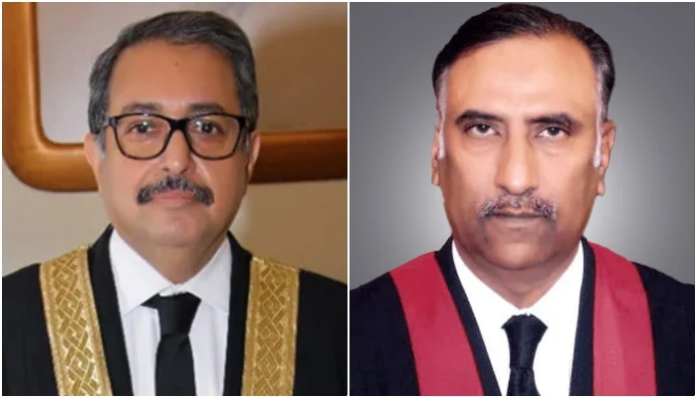ISLAMABAD, FEB 11 (DNA): Path for Justice Sarfaraz Dogar, who was transferred from the Lahore High Court (LHC), has been cleared to take over as the next chief justice of the Islamabad High Court (IHC) after the chief justice, Aamer Farooq, rejected a representation made by five judges of the IHC against the fresh changes in the seniority list.
Justice Dogar has become the senior-most judge among the IHC judges, as he took his oath as an LHC judge in 2015, after IHC Chief Justice Farooq rejected the representation, which was filed by Justices Mohsin Akhtar Kayani, Tariq Jahangiri, Babar Sattar, Sardar Ijaz, and Saman Riffat Imtiaz. The registrar’s office was instructed to inform the five judges of the decision, The News reported.
As per the sources, following the IHC CJ’s decision transfer of three judges, including Justice Dogar from the LHC, and one each from the Sindh High Court and Balochistan High Court, to the IHC has materialised.
The conflict arose following transfer of these judges that paved the way for adjustments in the seniority positions. The five justices, contesting the seniority criteria, were of the view that the judges transferred from other high courts should take oath anew to reset their seniority.
Nevertheless, their representation was rejected by CJ Farooq, saying the new oath was not required as their seniority was calculated from the time they took oath in their respective high court and not from the date of their transfer.
Hence, the seniority list revised after including the justices transferred from other high courts will remain the same. The CJ rejected the representation because of its distinguishing between the appointment and transfer of the judges, as the judges’ representation demanded fresh oath from the judges appointed to the IHC from other high courts, with seniority starting from the date of the new oath.
Meanwhile, the responsibility for legal affairs has been officially removed from Justice Babar Sattar and Justice Sardar Ijaz Ishaq. In their place, Additional Judge Justice Raja Inam Amin Minhas has been appointed as the new Legal Affairs Judge for the IHC. He will now oversee the operations of the court’s legal wing, a role he will assume with immediate effect.
The deputy registrar confirmed the appointment through a notification, following its consent by the CJ Farooq.
Separately, the Judicial Commission of Pakistan (JCP) on Monday nominated six judges for their appointment as judges of the Supreme Court (SC) besides nominating one judge as an acting judge of the apex court.
The JCP meeting was held here at the SC conference room at 2pm, with Chief Justice of Pakistan (CJP) Justice Yahya Afridi in the chair, being the commission chairman.
Agenda of the meeting was to consider the nomination of high court judges for their appointment as the SC judges. After thorough deliberations, the JCP nominated chief justices of Sindh, Balochistan, Islamabad and Peshawar high courts as judges of the Supreme Court, by majority.
The Commission also nominated two judges of the SHC and Peshawar High Court for their appointment as judges of the Supreme Court. Similarly, the Commission also, by majority of its total membership, nominated Justice Miangul Hassan Aurangzeb, a judge of the IHC, for his appointment as the SC acting judge.
Those four chief justices of high courts, who were nominated for their appointment as the SC judges, included: Justice Muhammad Hashim Khan Kakar (Balochistan), Justice Muhammad Shafi Siddiqui (Sindh), Justice Farooq (Islamabad) and Justice Ishtiaq Ibrahim (Peshawar).
Also, the Commission nominated SHC judge Justice Salahuddin Panhwar and PHC judge Justice Shakeel Ahmad as the SC judges. Meanwhile, two JCP members representing Pakistan Tehreek-e-Insaf (PTI) including its chairman and Member National Assembly Barrister Gohar Ali Khan and Senator Barrister Ali Zafar refused to participate in the Commission proceedings after their request for postponement of the meeting was denied.
Addressing the media outside the Supreme Court building, Gohar, flanked by Zafar, said they attended the JCP meeting and requested the Commission to postpone its meeting till the controversy surrounding the seniority of IHC judges was settled. However, he added, the Commission did not accept their request, hence they boycotted the further proceeding.
Barrister Zafar said he had already expressed his concerns in his letter to the CJP over the controversy surrounding the seniority of the IHC judges; therefore, he had requested the chief justice to postpone the meeting. He said that serious objections in writing had been raised by five IHC judges and four judges of the Supreme Court over the matter.
“As the Commission did not accept our request, we are under instructions not to participate in further proceedings, and we left the meeting,” Zafar added.
Separately, PTI Parliamentary Party Leader in Senate Barrister Zafar, while speaking in Geo News programme ‘Capital Talk’ on Monday, said judges’ transfer from three high courts to the IHC took place under Article 200 of the Constitution. However, moving of one judge on the seniority ladder after his transfer created the problem among judge of that court. He said the seniority matter was yet to be settled down on the judicial side.
Meanwhile, it was learnt that senior SC judges and the JCP members — Justice Mansoor Ali Shah and Justice Munib Akhtar — also left the Commission meeting after their request for postponement of the meeting was rejected.
According to sources, Justice Mansoor asked the Commission to postpone the meeting in the light of their earlier written request to the CJP. It was learnt that Justice Munib Akhtar also endorsed the request. However, after their request was not accepted, they left the meeting.
Recently, Justice Mansoor, Justice Munib, Justice Athar Minallah and Justice Ayesha A Malik, in a letter to CJP Yahya Afridi, had requested to delay the process of judges’ appointment to the SC and demanded constitution of a full court for hearing the petitions, challenging the 26th Constitutional Amendment.
Meanwhile, heavy contingent of police was deployed outside the SC as the All Pakistan Lawyers Action Committee had given a call for protest in the Supreme Court on Monday.
According to senior lawyers, Barrister Abid S. Zubairi and Hamid Khan, a larger number of lawyers had come from Lahore and Karachi in buses, but they were barred from reaching the SC by blocking all routes leading to the apex court.
They said peaceful lawyers were now protesting at Kashmir Highway, Serena Hotel and D-Chowk. Amanullah Kanrani and other senior lawyers were also present. They told the media outside the Supreme Court that the protest was being held against the JCP’s meeting, adding that the meeting was being held to bring judges of their own choice.
“Our protest is not for one day or a month but it will continue till the end of 26th constitutional amendment,” Hamid said, adding that the way the amendment was passed was a shame as they wanted to bring judge of their choice. He said there were a few “tout” lawyers, who were releasing statements in favour of the government.
Barrister Zubairi said if appointment of judges was made to the Supreme Court in this way, then there would be no difference between the incumbent judges and the PCO judges.
On the other hand, a large-scale protest by members of bar associations erupted in Islamabad on Monday, as lawyers rallied against the recent appointment of new judges and passage of the 26th Constitutional Amendment. What began as a peaceful demonstration quickly escalated, resulting in road blockages, violent clashes with police, and severe traffic disruptions across Islamabad.
The protest intensified when demonstrators attempted to breach the Red Zone, the high-security area housing key government buildings and foreign embassies. Lawyers attempted to access the Red Zone through multiple entry points, including Serena Hotel, Margalla Road, and Nadra Chowk. However, they were met with strong resistance from law-enforcement agencies. Police deployed barricades and used batons and tear gas to block their path, leading to tense confrontations.
Protestors, chanting anti-government slogans, condemned the judicial appointments as unlawful and unconstitutional, demanding their immediate reversal.
As the protests spread, they triggered major traffic congestion, particularly around Kashmir Chowk and other key intersections. Authorities responded by closing several major routes, including Serena Chowk, Nadra Chowk, Marriott Hotel Road, Express Chowk, and T-Cross Bari Imam. With the majority of routes leading to the Supreme Court blocked, Margalla Road became the sole accessible route to the court premises.
In a bid to maintain pressure, the protesting lawyers also blocked the Srinagar Highway after being denied entry into the Red Zone, further exacerbating Islamabad’s already strained traffic flow.
The Islamabad-Rawalpindi metro bus service was also disrupted, with partial suspension of services between Faiz Ahmed Faiz Station and the Pakistan Secretariat. However, services between Rawalpindi’s Saddar Station and Faiz Ahmed Faiz Station were later restored.
In response to the unrest, the law-enforcement agencies increased security around the Supreme Court and other sensitive government institutions. A heavy police presence was visible in these areas, with additional reinforcements stationed to prevent further escalation.
At the time of reporting, government officials had not issued a formal statement regarding the protests. However, sources suggest that talks with bar association representatives may be scheduled in an attempt to de-escalate tensions.
Legal experts have raised concerns that the ongoing unrest could disrupt judicial proceedings and further deepen divisions within the legal community.
As the situation continues to unfold, authorities have urged citizens to avoid affected routes and remain informed about road closures. The protests reflect the growing tension between the legal fraternity and the government over judicial independence and the appointment process.
Meanwhile, newly-appointed additional judges of the LHC took the oath of office here on Monday. LHC Chief Justice Aalia Neelum administered the oath to nine newly-appointed judges in a simple but impressive ceremony held at the LHC main lawns.
LHC Registrar Abher Gul Khan conducted the proceedings. The newly-appointed additional judges include Justice Hassan Nawaz Makhdoom, Justice Malik Waqar Haider Awan, Justice Sardar Akbar Ali, Justice Syed Ahsan Raza Kazmi, Justice Malik Javid Iqbal Wains, Justice Muhammad Jawad Zafar, Justice Khalid Ishaq, Justice Malik Muhammad Awais Khalid, and Justice Chaudhry Sultan Mahmood.
LHC judges, including Justice Shujaat Ali Khan, Justice Ali Baqar Najafi, and Justice Abid Aziz Sheikh, along with federal and provincial law officers, the president and office bearers of the Lahore High Court Bar, senior lawyers, LHC officers, and the families and friends of the newly appointed judges, also attended the ceremony. After appointments of these judges, the number of judges at the LHC has reached 43.

















